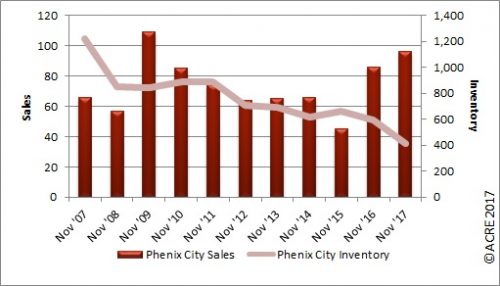Phenix City November home sales increase 12 percent from 2016

Sales in November were up from a year ago, up from October and up for 2017 so far. (iStock)
Click here to view or print the entire monthly report compliments of the ACRE Corporate Cabinet.
Sales: According to the Phenix City Board of Realtors Multiple Listing Service, Phenix City area residential sales totaled 96 units during November, up 11.6 percent from the same month a year earlier. Year-to-date sales through November increased 12.9 percent from the same period of 2016. Two more resources to review: Quarterly Report and the Annual Report.
For all of Phenix City’s area home sales data, click here.

Forecast: November sales were 20 units above the Alabama Center for Real Estate’s (ACRE) monthly forecast. ACRE’s 2017 sales forecast through November projected 997 closed transactions, while the actual sales were 1,048 units.
Supply: Phenix City area housing inventory in November totaled 415 units, a decrease of 30.1 percent from November 2016. Inventory levels have reduced 66 percent from the November peak in 2007. The inventory-to-sales ratio in November was 4.3 months of housing supply. Restated, at the November sales pace, it would take 4.3 months to absorb the current inventory for sale. The market equilibrium (balance between supply and demand) is considered to be approximately 6 months.
Demand: November sales increased by 4.3 percent from the prior month. Historical data indicate November sales on average (2012-16) decrease from October by 2.8 percent. The average number of days on the market until homes sold was 102 days, down 16.4 percent from the previous year and down 21.5 percent from October.
Pricing: The Phenix City median sales price in November was $135,725, a decrease of 11.1 percent from November 2016 and a decrease of 0.9 percent from the prior month. This direction contrasts with historical seasonal data (2012-16) that reflect the November median sales price on average increases from October by 4 percent. The differing sample size (number of residential sales of comparative months) can contribute to statistical volatility, including pricing. ACRE recommends consulting with a real estate professional to discuss pricing, as it will vary from neighborhood to neighborhood.
Industry perspective: “The economy and real estate markets continue to show they are resilient. Regardless of the economic metric — GDP, monthly jobs or home prices — the dashboard registers an ‘all-systems-go’ economy,” said KC Conway, director of research and corporate engagement at the Alabama Center for Real Estate. “GDP started the year off with its best Q1 reading in several years and followed it up with above 3 percent readings for Q2 and Q3. (This year) will be the first year since the financial crisis that the economy registered an annual GDP greater than 2 percent. It was just plus 1.6 percent for 2016.
“Job growth is healthy as well. The first week of December the market received solid monthly jobs reports from both ADP (which measures private industry job formation) and the BLS (the government’s monthly jobs report produced by the Bureau of Labor Statistics). ADP reported a healthy new 190,000 private-sector jobs for November and a monthly average of 210,000 jobs over the prior 12 months. The BLS reported November jobs at a higher-than-expected level of 228,000 jobs – and its year-to-date monthly average is 174,000. Unemployment remains low at 4.1 percent, and inflation was just reported on December 13th at 1.7 percent for the “core rate” (which excludes the more volatile food and energy components) and 2.2 percent overall annualized due to higher energy prices.
“The Federal Reserve is taking note of the expanding economy and followed up its prior two rate hikes earlier in 2017 with a 0.25 percent rate increase at its December 13th meeting. Housing conditions remain conducive to growth in new supply and more transaction activity. Single-family home inventories are below demand levels across the nation, Southeast and most Alabama markets. The national rate of appreciation is running above 6 percent on the heels of 5-plus percent in 2016. This is leading builders and lenders to be more receptive to adding inventory. New housing starts and permits will likely end 2017 at or above the 1.3 million units level, split 30 percent multifamily and 70 percent single-family. The outlook heading into 2018 is the best we have seen in a decade.”
Click here to download graphs from the Phenix City November Housing Report, including Total Sales, Average Sales Price, Days on the Market, Total Inventory and Months of Supply.
The Phenix City Residential Monthly Report is developed in conjunction with the Phenix City Board of Realtors to better serve area consumers.





